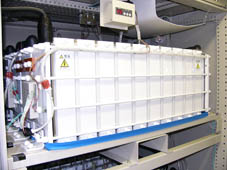Testing of Wind Power Stabilization System Starts
Oct. 01, 2007

|
Tokyo, October 1, 2007 – Fuji Electric Systems Co., Ltd., Kawasaki Heavy Industries, Ltd., Shin-Kobe Electric Machinery Co., Ltd. and Nissan Diesel Motor Co., Ltd. announced today that they have jointly started testing of a stabilization system for wind power generation. Testing began in August at the Nishime wind farm operated by Win-power Co., Ltd. following the installation and completion of preliminary inspections and on-site testing procedures. Wind power output varies depending on wind speed and direction. A wind power stabilization system controls fluctuations in voltage and frequency caused by changes in output. These fluctuations have been a major barrier blocking the widespread implementation of wind power generation. The stabilization system cancels the frequency fluctuations that affect the power network system in order to deliver a stable power supply. The jointly developed wind power stabilization system is the world’s first hybrid system employing secondary batteries (lead-acid or nickel hydride batteries) and electric double-layer capacitors. This hybrid structure allows for compensation to fluctuations in frequencies ranging from a few seconds to several tens of minutes at the optimal system capacity while prolonging the life of the system. The system is being tested at the fully operational wind power station with an aim to improving the performance, developing technologies needed for the optimal use of secondary batteries and electric double-layer capacitors and gaining the know-how for operating the system in commercial applications. The system used in the testing stabilizes the power output through either individual or hybrid operation of lead-acid secondary batteries (manufactured by Shin-Kobe Electric Machinery), nickel hydride batteries (manufactured by Kawasaki) and electric double-layer capacitors (manufactured by Nissan Diesel). It consists of a bidirectional inverter equipped with a system controller for nickel hydride batteries (manufactured by Kawasaki), system controllers for lead-acid batteries and electric double-layer capacitors and a bidirectional inverter (manufactured by Fuji Electric Systems) and other components. Optimal operation control methods are examined and evaluated during the testing. Test data will be accumulated with an eye to reducing the size of the power stabilization system and prolonging the life of the batteries. The Gigacell®, a new large-capacity nickel metal hydride battery to be used in the system is currently under development by Kawasaki. Leveraging the benefits of the Gigacell will expand the potential for wind power stabilization. The Gigacell offers all the advantages of nickel metal hydride batteries, including quick and efficient charge/discharge capabilities as well as operational ease at ambient temperatures. It can also be easily manufactured in large capacity sizes and has a long life. Wind power stabilization requires charging or discharging a large amount of power when there is a sudden surge in power output. The Gigacell is expected to perform that operation with much smaller capacities in comparison with other types of batteries. Kawasaki successfully demonstrated the Gigacell’s smoothing effect on wind power output fluctuations in a test conducted jointly with the Ashikaga Institute of Technology in 2006. Kawasaki has been making R&D efforts to improve storage batteries with the goal of expanding the use of renewable energy sources such as wind power generation under the New Energy and Industrial Technology Development Organization (NEDO) project for the Development of an Electric Energy Storage System for Grid-Connection with New Energy Resources. Kawasaki is also working to expand applications of the Gigacell to include power sources for large-size transportation vehicles such as rolling stock and regenerative electric power recovery. |





